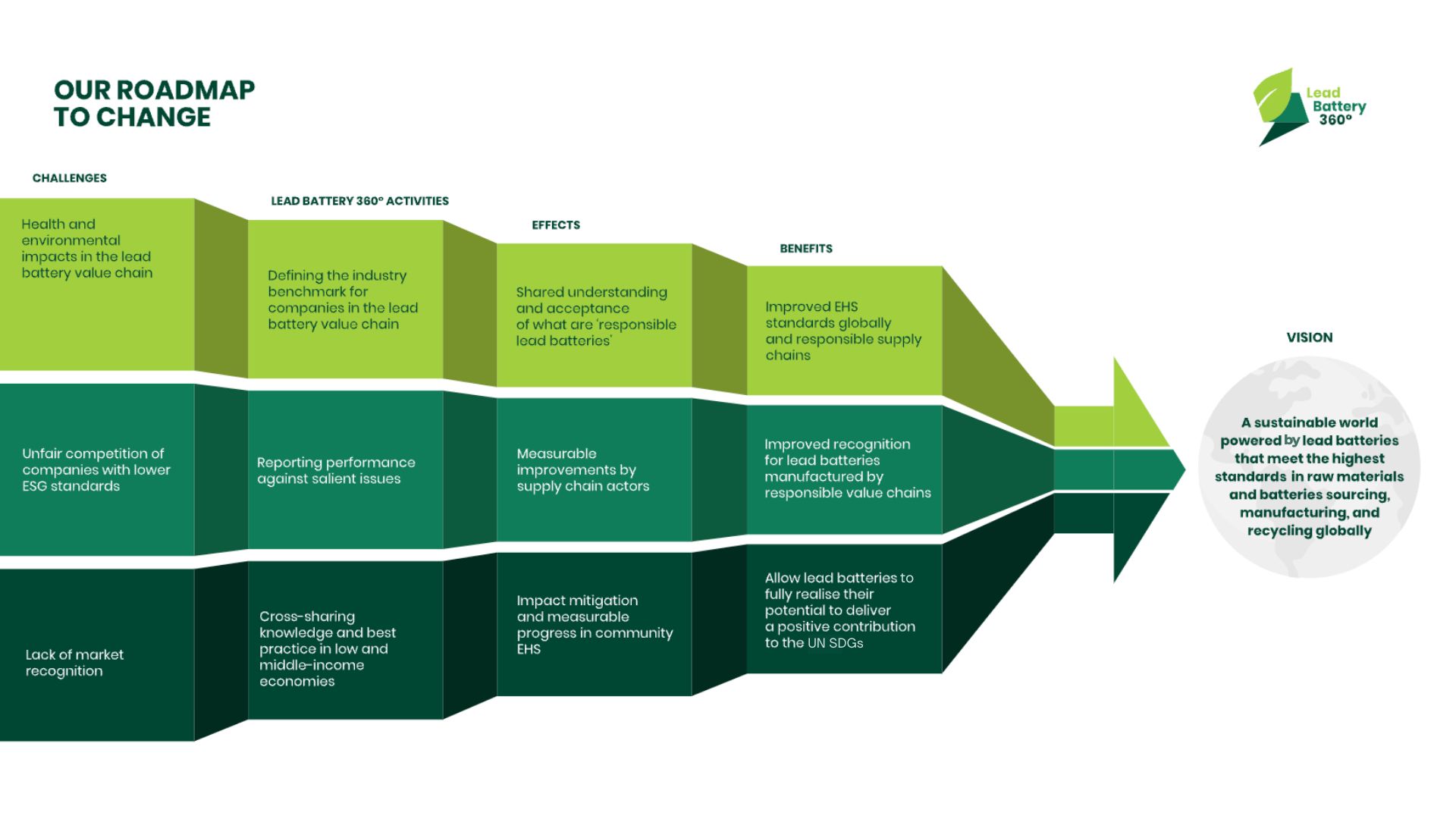VISION
A sustainable world powered by lead batteries that meet the highest standards in raw materials and batteries sourcing, manufacturing, and recycling globally

Health and environmental impacts in the lead battery value chain
The improper or substandard recycling and handling of materials and products containing lead increases the risk of lead exposure for workers and communities. Informal recycling of lead batteries is never acceptable and results in widespread pollution and has scant regard for the wellbeing of individuals working in these facilities. Lead Battery 360° provides a framework to encourage operations throughout the battery value chain to employ measures necessary to manage risk of lead exposure to their employees and limit environmental emissions.
Wide range of ESG standards in a global marketplace
High environmental, social and governance (ESG) standards should be a baseline for any company operating in the lead battery value chain. Combined with improved local regulatory oversight, market recognition for a minimum standard of environmental, health and safety performance helps to level the playing field as is the benchmark for a responsible value chain.
Lack of market recognition for ESG performance
In many regions there is insufficient market recognition from customers and the investment community for batteries that are manufactured to the highest ESG standards. The Lead Battery 360° programme, provides a vehicle for such recognition.
Defining the industry benchmark for companies in the lead battery value chain
Lead Battery 360° Guidelines describe the actions that responsible operations along the value chain should take to ensure that lead batteries continue to deliver economic and sustainability benefits without negatively impacting human wellbeing and the environment. Members are encouraged to go beyond compliance, and to focus on continuous improvement of responsible production.
Reporting performance against salient issues
Participation in the Lead Battery 360° programme includes a requirement for companies to report on some of the critical aspects which define responsible management of lead exposures and other environmental, social and governance issues.
Cross-sharing knowledge and best practice in low and middle-income economies
As part the Lead Battery 360° initiative, participants commit to supporting global partners to tackle informal and substandard lead battery manufacturing and recycling worldwide. We will use our knowledge of environmentally sound management of lead battery manufacturing and recycling to advise NGOs, governments, communities, and companies on best practice methods to help improve standards and protect communities.
Shared understanding and acceptance of what are ‘responsible lead batteries’
The Lead Battery 360° Guidelines will allow industry practitioners and external stakeholders to obtain a shared understanding of what it means to produce and recycle lead batteries responsibly. The Lead Battery 360° defines environmental, social, and governance performance expectations for companies that are signed up to the seven guiding principles and are engaged in a responsible lead battery value chain.
Measurable improvements by supply chain actors
Defining Industry agreed Key Performance Indicators and reporting methodologies allows members of Lead Battery 360° to measure and report progress on salient issues, including reducing lead exposures, and to set targets for continuous improvement.
Impact mitigation and measurable progress in community EHS
Through our knowledge sharing and capacity building programmes targeted at governments, businesses, and communities in low and middle income countries, we will make a concrete contribution towards improving the environmental, health, and safety performance of lead battery manufacturing and recycling operators around the world.
Improved EHS standards globally and responsible supply chains
Membership of Lead Battery 360° will encourage facilities to adopt good environmental, social and governance standards and to strive for continuous improvement, irrespective of geographical location. This will contribute to building responsible supply chains along a lead battery’s entire journey, from mining through to recycling.
Improved recognition for lead batteries manufactured by responsible value chains
By adopting the measures described in Lead Battery 360°, facilities will be able to demonstrate that they are operating to high environmental, social and governance standards and adopting internationally accepted responsible operating practices This will allow better recognition by their employees, neighbors, customers, investors and civil society.